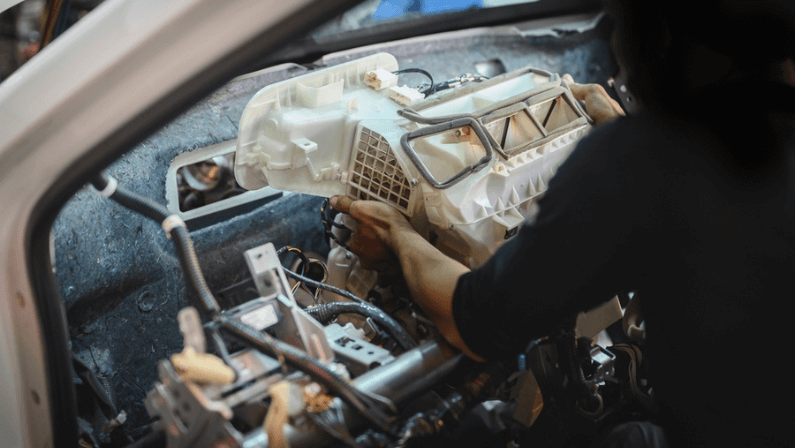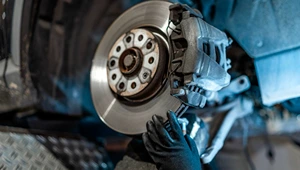Maintaining your vehicle’s heating and air conditioning system is one of the key factors to have a comfortable ride, no matter what the season is.
Sometimes, when you’re facing the scorching heat of summer or the chilly winds of winter, a well-functioning HVAC system helps to make your driving experience remain pleasant and safe.
In this comprehensive guide, we’ll walk you through the basics of auto repair for air conditioning.
What Are The Main Components Of A Car’s Heating And Air Conditioning System?

Understanding the main components of your car’s heating and air conditioning system is important for diagnosing problems and performing effective repairs.
Let’s break down the key components that make up this intricate system.
1. Heater Core
The heater core is a small radiator-like device located in the dashboard. It functions by transferring heat from the engine’s coolant to the air that blows into the cabin. When you turn on the heater, hot coolant flows through the heater core, and a fan blows air over it, sending warm air into the vehicle. Common issues with the heater core include leaks and blockages, which can result in a lack of heat or coolant loss.
2. Compressor
The compressor is often considered the heart of the air conditioning system. It pressurizes the refrigerant and circulates it throughout the system. Located in the engine bay, the compressor is powered by the vehicle’s engine via a belt. When the air conditioning is turned on, the compressor pumps refrigerant to the condenser. A failing compressor can lead to insufficient cooling and unusual noises from the engine bay.
3. Condenser
The condenser is located at the front of the car, usually near the radiator. Its primary function is to dissipate heat from the refrigerant after it has been compressed. As the hot refrigerant flows through the condenser, it cools down and changes from a gas to a liquid. A damaged or clogged condenser can reduce the efficiency of the air conditioning system, leading to warmer air inside the vehicle.
4. Evaporator
The evaporator is situated inside the vehicle’s dashboard. Its role is to absorb heat from the air inside the car. As the refrigerant passes through the evaporator, it evaporates and absorbs heat, cooling the air. The cooled air is then blown into the cabin. Problems with the evaporator, such as leaks or blockages, can result in poor cooling performance.
5. Blower Motor
The blower motor is responsible for pushing air through the HVAC system and into the vehicle’s cabin. It works with both the heating and air conditioning systems. When you adjust the fan speed on your dashboard, you are controlling the blower motor. A malfunctioning blower motor can lead to weak airflow or no air coming from the vents at all.
6. Refrigerant
Refrigerant is the fluid that circulates through the air conditioning system, absorbing and releasing heat to cool the interior of the vehicle. It changes state between gas and liquid as it moves through different components. Low refrigerant levels, often due to leaks, can cause the air conditioning system to lose its cooling efficiency. Regular checks and recharges of the refrigerant are important for maintaining optimal performance.
What Are The Most Common Issues With Automotive HVAC Systems?

Automotive heating, ventilation, and air conditioning (HVAC) systems can experience a range of problems that affect their performance.
Identifying these common issues early can help prevent more serious and costly repairs.
- Refrigerant Leaks: Low refrigerant levels due to leaks can lead to insufficient cooling.
- Blower Motor Failure: A faulty blower motor can result in weak or no airflow from the vents.
- Heater Core Blockage: Blockages in the heater core can cause inadequate heating and coolant loss.
- Compressor Problems: A failing compressor can produce unusual noises and reduce cooling efficiency.
How Do You Diagnose HVAC Issues In Your Car?
Diagnosing HVAC issues in your car involves a series of checks and observations to pinpoint the source of the problem.
By systematically inspecting key components, you can identify and address the underlying issues.
- Check Refrigerant Levels: Low refrigerant levels often indicate a leak and can be checked using a pressure gauge.
- Listen for Unusual Noises: Unusual sounds from the HVAC system can indicate problems with the compressor or blower motor.
- Inspect Airflow: Weak or no airflow from the vents may suggest issues with the blower motor or clogged filters.
- Monitor Temperature Output: Inconsistent or incorrect temperature output can signal problems with the heater core or thermostat.
What Are The Typical Problems Specific To The Car’s Heating System?
The heating system in a car can encounter specific issues that affect its ability to provide warmth during colder months.
Recognizing these problems early can help your vehicle stay comfortable and safe.
- Heater Core Leaks: Leaks in the heater core can lead to coolant loss and insufficient heating.
- Thermostat Failure: A malfunctioning thermostat can prevent the engine from reaching the optimal temperature, resulting in poor heater performance.
How Do You Repair Or Replace A Faulty Heater Core?

Auto AC and heat repair is a complex task that requires careful attention to detail.
Following these steps for a successful repair or replacement.
- Diagnose the Issue: Confirm that the heater core is the source of the problem by checking for leaks, unusual smells, or poor heating performance.
- Drain the Coolant: Before beginning any repairs, drain the coolant from the vehicle to prevent spills and guarantee safety.
- Remove the Dashboard: Accessing the heater core often requires removing the dashboard, which involves disconnecting various components and fasteners.
- Install the New Heater Core: Once the faulty heater core is removed, install the new one, reassemble the dashboard, and refill the coolant.
How Often Should You Service Your Car’s HVAC System?
Regular servicing of your car’s HVAC system helps to maintain its efficiency and longevity. It is generally recommended to have car AC and heater repair and serviced at least once a year, ideally before the onset of extreme weather conditions. During these check-ups, a professional technician can check refrigerant levels, inspect for leaks, clean or replace filters, and make sure all components are functioning correctly. Regular maintenance not only helps prevent unexpected breakdowns but also optimal performance and comfort throughout the year.
How Do You Choose A Reliable Mechanic For HVAC Repairs?
Selecting reliable car shops that fix AC is key for quality service and avoid future issues.
Here are some key factors to consider when making your choice for air conditioning auto repair providers.
- Check Certifications: The mechanic should be certified by recognized automotive organizations such as ASE (Automotive Service Excellence).
- Read Reviews: Look for customer reviews and ratings online to gauge the mechanic’s reputation and service quality.
- Ask for Recommendations: Seek recommendations from friends, family, or coworkers who have had positive experiences with HVAC repairs.
- Compare Quotes: Obtain estimates from multiple mechanics to compare pricing and services offered for transparency and fairness.
What Are The Typical Costs Associated With HVAC Repairs?
Understanding the typical costs associated with auto AC and heater repair can help you budget effectively and avoid unexpected expenses.
Here are some common costs to consider.
- Diagnostic Fees: Initial diagnostic tests can cost between $50 and $100, depending on the complexity of the issue.
- Parts Replacement: The cost of replacing components like the compressor or blower motor can range from $200 to $1,000 or more, including parts and labor.
- Labor Charges: Labor costs for HVAC repairs typically range from $75 to $150 per hour, varying by location and mechanic experience.
Can You Upgrade Your Car’s HVAC System For Better Performance?
Yes, you can upgrade your car’s HVAC system for better performance by getting auto heating and cooling repair services. Upgrades may include installing a more efficient compressor, adding advanced climate control features, or using higher-quality refrigerants.
These enhancements can improve cooling and heating efficiency, provide more precise temperature control, and potentially extend the lifespan of the system.
Additionally, upgrading to modern components can enhance overall comfort and energy efficiency, making your driving experience more enjoyable and economical.
How Does Seasonal Maintenance Affect The Longevity Of Your HVAC System?
Seasonal maintenance significantly impacts the longevity of your car’s HVAC system, making sure that all components are functioning optimally and catching potential issues early.
Regular checks before the summer and winter months help to prevent unexpected breakdowns and maintain system efficiency.
This proactive approach includes inspecting and replacing filters, checking refrigerant levels, so the heater core and compressor are in good condition.
Automotive Heating and Air Conditioning Repair FAQs
Here are answers to some frequently asked questions about automotive heating and air conditioning repair to help you better understand and manage your vehicle’s HVAC system.
How long do car HVAC systems typically last?
Car HVAC systems typically last between 8 to 12 years with proper maintenance.
Can a malfunctioning HVAC system affect other parts of the vehicle?
Yes, a malfunctioning HVAC system can strain the engine and electrical system, potentially leading to other issues.
What should you do if your car’s HVAC system stops working suddenly?
If your car’s HVAC system stops working suddenly, check the fuses and refrigerant levels, and seek professional assistance if needed.
Why is my car’s AC blowing warm air?
Your car’s AC may be blowing warm air due to low refrigerant levels, a faulty compressor, or a clogged condenser.
How do I know if my AC system is leaking?
You may have an AC system leak if you notice reduced cooling performance, hissing sounds, or oily residue around AC components.
Ensuring Your Car’s HVAC System Runs Smoothly
Understanding the main components, common issues, and the importance of seasonal maintenance helps you keep your HVAC system in optimal condition. When repairs are necessary, choosing a reliable mechanic is a top factor for guaranteeing quality service.
If you’re looking for a trusted mechanic and car air conditioning repair shop in Houston, Status Automotive & Collision is your go-to destination for top-notch HVAC repairs. Our experienced technicians provide comprehensive services to keep your vehicle’s climate control system running efficiently.
Contact us today to schedule a repair so your car remains comfortable year-round.




